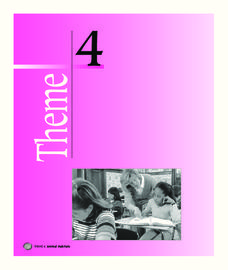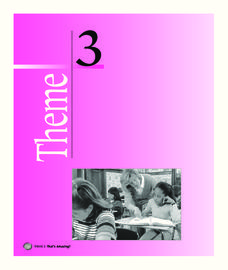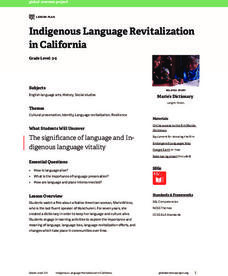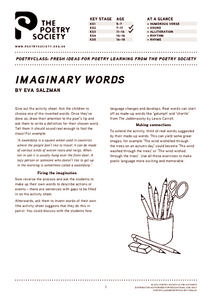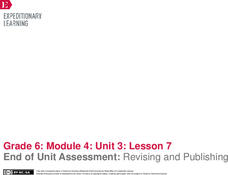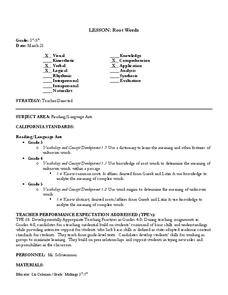Global Oneness Project
Cultural Heritage: Recording a Native Language Dictionary
How do you rebuild a language that has been banned for years? A short video introduces high schoolers to Marie Wilcox, A Wukchumni Native American from Central California who, for over 20 years, worked on comprising a dictionary of the...
All About Reading
Pirate Dictionary
Shiver me timbers, this here resource is a great way to teach young landlubbers to speak the language of the briny deep. Including over 30 different words and phrases, complete with definitions and guide words, this dictionary will have...
Houghton Mifflin Harcourt
Around Town: Neighborhood and Community: English Language Development Lessons (Theme 3)
Here is a unit designed to support English language development. Scholars speak, move, and write to learn more about topics that focus on community and local concepts. The series of lessons aids to reinforce concepts including consonant...
Houghton Mifflin Harcourt
Smart Solutions: English Language Development Lessons (Theme 6)
Smart Solutions is the theme of a unit created to meet the needs of English language earners. Through a series of lessons, scholars follow a routine—move, speak, and listen— to cover topics including stores, shops, celebrations, pets,...
Houghton Mifflin Harcourt
Off to Adventure!: English Language Development Lessons (Theme 1)
Give language skills a boost with a series of ESL lessons in an Off to Adventure! themed unit. Using a speak, listen, move, and look routine, scholars enhance proficiency through grand conversation and skills practice. Discussion topics...
Houghton Mifflin Harcourt
Animal Habitats: English Language Development Lessons (Theme 4)
This activities in this packet, the second in the series of support materials for the Houghton Mifflin Harcourt thematic units on animal habitats, are designed specifically for English language learners.
Houghton Mifflin Harcourt
That’s Amazing!: English Language Development Lessons (Theme 3)
That's Amazing! is the theme of an English language development unit created by Houghton Mifflin. Following a speak, look, move, and listen routine, scholars delve into topics; seasons, weather, animals, landforms, telling time,...
TLS Books
Dictionary Skills Review
Why do we use a dictionary? Your scholars will tell you why while demonstrating their dictionary skills. In addition to stating the purpose of using dictionaries, they will also show what they know about guide words, alphabetizing, and...
Global Oneness Project
The Importance of Indigenous Language Revitalization
Middle schoolers consider languages as representations of cultures and the importance of preserving various languages, especially the rapidly disappearing languages of indigenous peoples, in a lesson that tells the story of Marie Wilcox...
Curriculum Corner
“I Can” Common Core! 3rd Grade Language
Support third graders with developing their language skills using this Common Core checklist. With each standard written as an I can statement, children are given clear learning goals to work toward throughout the year.
Amazon Web Services
Idiom Dictionary
Examining idioms is a peace of cake when using this graphic organizer! Here, grammarians identify an idiom and use it in a sentence. Then they investigate its literal meaning versus its figurative meaning, and accompany each one with a...
Global Oneness Project
Indigenous Language Revitalization in California
A film showcases a Native American woman and her hard work to create a dictionary detailing her tribe's language. While viewing, scholars reflect upon and discuss the importance of language and sustaining cultural identity.
Scholastic
Frindle Lesson Plan
"Who says a pen has to be called a pen? Why not call it a frindle?" Inspired by this quote from the award-winning novel written by Andrew Celements, this lesson allows children to invent their own terms for common classroom objects,...
Poetry Society
Imaginary Words
Oh, what fun! Young logophiles and neologists create a dictionary-sounding definition for imaginary words and try to fool their classmates.
ESL Kid Stuff
Rooms of a House
Language learners create and label the rooms in a house and then add and label images of objects that may be found in each room.
Lawrence Virtual School
Context Clues
Considering a lesson on using context clues to figure out the meaning of unfamiliar words? This packet includes a brief reading passage about strategies readers can use and 12 very different graphic organizers, including a template for a...
EngageNY
End of Unit Assessment: Revising and Publishing
Dictionaries, thesauruses, word walls, oh my! Pupils use several resources to revise their position papers to include appropriate vocabulary. Then, after peer editing, scholars write the final drafts of their essays and self-assess using...
Haut Gap Middle School
Root Words
Scholars demonstrate their knowledge of root words aqua and aud, and develop vocabulary skills by completing of a chart, handout, and worksheet using creative thinking skills, a dictionary, and a thesaurus.
Poetry4kids
Simile and Metaphor Lesson Plan
Similes and metaphors are the focus of a poetry lesson complete with two exercises. Scholars read poetry excerpts, underline comparative phrases, then identify whether it contains a simile or metaphor. They then write five similes and...
EngageNY
Launching The Performance Task: Building Background Knowledge: “War in the Pacific,” Part 1
It's all about a bit of give and take. Scholars silently read War in the Pacific and circle any unfamiliar words. Using context clues, they write each word on a strip of paper along with the inferred definition. After looking the word up...
EngageNY
Reading for Gist, Answering Text-Dependent Questions, and Determining Author’s Purpose: Industrial Food Chain
A Reading Closely: Guiding Questions handout leads readers to discover the gist of The Omnivore’s Dilemma. While reading, pupils look closely at the words in the text and discuss their meaning. They use dictionaries when needed to answer...
Prestwick House
Connotative vs. Denotative Meanings
Besides the dictionary definition, words also carry the added weight of meanings that are inferred or implied, meanings conferred on words, or connotations. To gain an understanding the importance of connotation, class members engage in...
EngageNY
Resource Materials and Gathering Information: Reading Another “Choice” Text from the Research Folder
Look it up. Scholars use a dictionary and thesaurus to verify the meaning of the research vocabulary words they defined in the previous activity. They then use sticky notes to write a synonym for each word. Finally, individuals choose a...
Rainforest Alliance
Sounds of the Rainforest
Do you hear what I hear? Encourage scholars to use their listening skills and participate in a series of activities that demonstrate how the sense of hearing is crucial to the human and animal world. Activities guide learners on nature...







